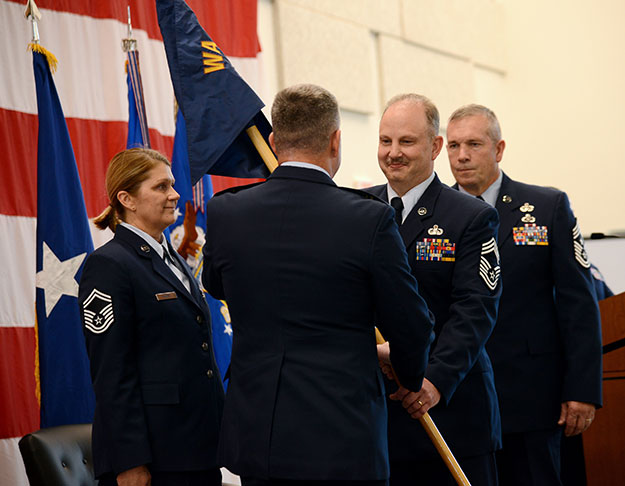(Photo: Chief Master Sgt. Marvin Boyd accepts the Washington Air National Guard Guidon from Brig. Gen. Jeremy Horn, commander of the Washington Air National Guard during the Change of Responsibility ceremony, Dec. 7, 2019, at Camp Murray.)
Washington Air National Guardsmen are facing a range of new challenges, particularly with navigating through uncharted waters presented by the Novel Coronavirus outbreak.
"We're social people, and when we can't get out there and make those one-on-one interactions, it changes how we do our jobs and accomplish the mission," said Chief Master Sgt. Marvin Boyd, Washington Air National Guard Command Chief.
The WA ANG's top enlisted airman has emphasized the need to be adaptable, ready, and resilient during these difficult and challenging days ahead. There isn't an easy solution to this current and untested position, but we can start with relying on our years of training, he said.
 With over 30 years of military experience, Boyd was only two months into his current position when the COVID-19 outbreak emerged in the United States. The first case appeared here in the Pacific Northwest in Snohomish County Jan. 19.
With over 30 years of military experience, Boyd was only two months into his current position when the COVID-19 outbreak emerged in the United States. The first case appeared here in the Pacific Northwest in Snohomish County Jan. 19.
"We normally ask a lot of our airmen, especially our traditional force here in the state who have other full-time jobs," Boyd said. "Whether it's working on fire teams in the summer, taking on voluntary deployments or just making the long drive (that some members make) for drill weekends."
As the COVID-19 outbreak has spread, WA Air Guardsmen have been asked to support a variety of projects. Members from the 194th Wing here, 141st Air Refueling Wing in Spokane, and Western Air Defense Sector on Joint Base Lewis-McChord, have been working at food banks, setting up tents for staging potential testing stations, and keeping communications operations functioning at a high volume.
"Communications is the key to all of this," Boyd explained. "As we practice social distancing, we are using every tool available ... as we are working from home, using different apps and computer networks to keep the flow of our mission going ... it has been critical."
In a recent Facebook town hall April 2, Air National Guard Command Chief Master Sgt. Ronald Anderson reiterated this point. He called on every airman to rise to these new challenges.
"Our jobs as your senior leaders at the Air National Guard and mine especially as Command Chief is to provide tactical leadership and to build flexibility to get the mission done," Anderson said, opening the question to others online. "This is something I'll ask all of you. How do we effectively train our airmen at their home stations in a virtual drill environment?"
Both Anderson and Boyd focused on readiness skills, flexibility and preparation as the key to working through the current work atmosphere. "We've got to continue to build readiness; we've got to continue to educate, train and build our airmen," Anderson said.
As a traditional Guardsman, Boyd works full time for the Veteran's Administration in Spokane as the Facility Telehealth Coordinator for the past seven years. In many ways, he has vast experience in the cyber-connected work environment where multitasking is crucial to working with staff and veterans.
"With this coronavirus, it has put a huge strain on some of the bandwidth because so many of us are on the Internet now," he said, yet correlated how well the communication system within the Department of Defense is working. "This has tested all our systems in a real-time undertaking and our network(s) in the Guard have held up extremely well."
In many ways, Boyd is uniquely knowledgeable and prepared for this COVID-19 pandemic response having spent 10 years working in a variety of healthcare jobs in the U.S. Navy. This includes starting as a Navy Hospital Corpsman, then as an Aerospace Medical Technician and finally a Physical Therapy Technician.
"After I left the Navy and joined the National Guard, I've gone on to do other jobs outside of the medical field," he said. "But these skills are important when we all train to do first aid and buddy care."
While his civilian and military jobs and years of military experience all are crucial on the front lines of this pandemic, Boyd is quick to emphasize that each of us has a significant role to play in reducing the spread of COVID-19.
"We're telling everyone to really practice all the basics; from hand washing, social distancing and stress reduction," he said, also adding the importance of getting outside to walk the dog or hike in areas less populated.
"If we can have our airmen to trust in their preparation and resiliency skills and take advantage of this time to focus on their families, we're all going to come out of this with some new insights," he said. "But more importantly, we want everyone to come out of this time healthy and with a renewed commitment with why we ‘signed up to serve our communities' in the first place."





Read Comments